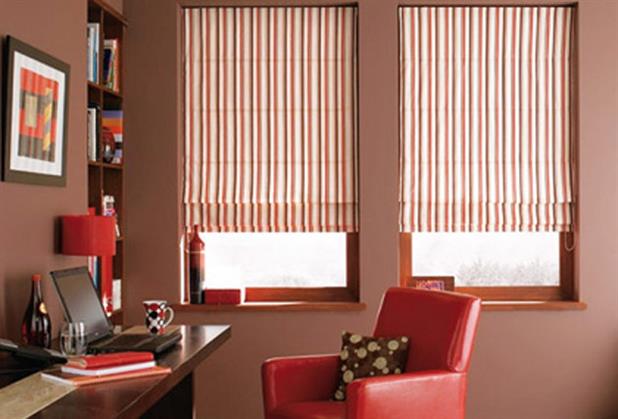While Bing Crosby may be dreaming of a white Christmas, Cormac Diamond’s list for Santa contains a somewhat different desire – to print mince pies on blinds.
“You never know what a customer might want,” he says, laughing. Despite having no background in the lucrative window industry, Diamond, 36, a former mechanical engineer, set up Bloc Blinds five years ago, and business appears to be booming.
After spotting a gap in the market during the credit crisis, he developed an interchangeable roller blind system – installable with just four screws – that lets customer easily change the fabric without having to remove the whole frame. It has proved so popular that when the Northern Irish company, based in Draperstown, County Londonderry, launched a Christmas-themed blind in December last year, customers were keen to buy.
“It gave us the courage to invest in a printing machine so we can really go to town with new designs this year,” says Diamond. The company, which has 42 employees, is now planning to launch a service that lets customers design their own fabric.
“If, for instance, you had green cushions, and wanted to match a blind to them, we can now easily replicate the exact colour rather than travelling the country to find a suitable fabric,” Diamond explains.
“It’s a quirky thing, but in the past people would have ruled it out as being complete nonsense, purely from the cost of the fixture.
“But now, with the advent of an interchangeable blind, you can cheaply print whatever you like, even ‘happy birthday’ blinds, and hang it up for a few hours then take it down again.”
After being spotted at a trade show in Germany four years ago, Bloc Blinds has been selected by John Lewis as a category brand, meaning it will have dedicated areas in stores.
But prospects have not always been so rosy. Bloc Blinds launched at the height of the credit crunch, when consumers were watching their spending. Amid the frequent redundancies of the financial crisis there was no shortage of workers available, but none of them had the right skills.
“One major challenge we had was finding staff – there were lots of workers, but none of them were blind makers,” says Diamond. “A lot of people thought I was mad for starting a business at that point.”
With training, the workers soon started production, but finding clients was an entirely different matter – Diamond hadn’t hired a sales team.
Despite his relatively limited business experience, he visited prospective buyers alone with a suitcase full of samples. He says he regularly used gut instinct to make business decisions, and it paid off; once retailers saw the product and its potential and its uniqueness, they started to buy into it. “It was a steep learning curve,” he admits.
Indeed, squeezed by the credit crunch, the company’s customers had been trying to improve their margins by buying cheaper products, but quickly realised that quality was more important to avoid complaints and returns.
Fortunately, Bloc Blinds wasn’t overly affected by the financial doom and gloom hurting many British industries. Rather than getting capital from banks, most of the company’s funding instead came from family members.
“It stood us in good stead. Every pound and every penny is still looked after,” explains Diamond. “When it’s from people you know and not a loan from a bank, you really have got a greater feel for the value of the money.”
The constraint on funding meant that the company’s expansion was cautious, and largely funded from profits, which is still the case.
“The ethos of the business is that it must be sustainable. We must take our growth seriously, and the expenditure involved in that must be well thought out,” he explains. “Those early years really taught us to know the value of money and investing our own money.”
Within a year, Bloc Blinds moved from producing five blinds per week to 100.
Now the company is planning to expand into the American market, where Diamond thinks that seasonal blinds – such as for Halloween, as well as Christmas – will be particularly popular.
“It’s going to fit their market well. Our ethos will chime with the Americans, as we have a strong success story behind our products,” he says.
Although the firm has meetings set up with two large US retailers, the stateside launch will primarily be on the internet so that it can target consumers directly – a strategy that is already working wonders in Europe.
“The medium of the internet is perfect for us to get the product out to new markets.”
In the UK, Bloc Blinds currently works with 500 independent retailers, a number that it plans to increase.
However, Diamond plans to expand the number of trade partners during the next year, so that Bloc Blinds becomes a household name “available in every town and city across the UK”.
He adds: “We would like to become the new Dyson.
“They’ve got something unique – people associate the bagless vacuum cleaner with Dyson and that is what we want to do with interchangeable blinds.”
Far from the days when finding skilled workers was the biggest challenge, now Diamond says that it’s managing the growth of the company.
Bloc Blinds is in the process of amalgamating multiple production facilities into a single site, which he hopes will further spur growth as it moves into new markets.
But Diamond has not lost touch with the company’s roots.
“If you start off with a hands-on approach, it’s very difficult to get away from it,” he explains.
Indeed, while the entrepreneur has had to reduce the time he spends on the factory – or house – floor, he says that sometimes “you just have to get your hands dirty”.
“There’s nothing like going out and fitting blinds yourself to get a true feeling of what customers think,” he concludes.
http://www.telegraph.co.uk/finance/festival-of-business/11008484/Bloc-Blinds-custom-designs-make-for-good-times.html
 Hillarys: hires MediaCom for its media business
Hillarys: hires MediaCom for its media business


